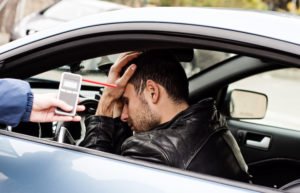
Driving with a blood alcohol content (BAC) of 0.08% or higher is a DUI in Arizona, even if the driver feels sober and is unimpaired. Commercial drivers in commercial vehicles have a lower legal limit of below 0.04%.
Due to Arizona’s zero-tolerance policy, underage drivers under 21 years old may not drive with any alcohol in their system at all.1
Here are three things to know about Arizona’s DUI alcohol limit:
1) Drunk drivers can be arrested with a legal BAC
Being in actual physical control of a motor vehicle while impaired by alcohol – even by the slightest degree – is always a crime. It makes no difference if their BAC is low. This typically applies to people with low-alcohol tolerances: Even having just one beer or one glass of wine at dinner could cause them to be under the influence. Evidence of being under the influence – even with a legal BAC – may include:
- Swerving
- Disobeying traffic signals and signs
- Having slurred speech
- Having bloodshot eyes
- Failing the DUI field sobriety tests (the walk-and-turn, the one-legged-stand, and the horizontal gaze nystagmus eye test)
Note that DUI also encompasses driving under the influence of drugs. So “drugged drivers” can face criminal charges even though their blood alcohol concentration may be 0.00%. Because drugs cannot be detected by breath tests, all drugged driving suspects who get arrested are required to submit to an evidentiary blood test.2
2) There are three classes of DUI offenses based on BAC
The Arizona crime of DUI is driving with a BAC of 0.08% to less than 0.15%. Meanwhile, the crime of Extreme DUI is driving with a BAC of 0.15% to less than 0.20%. Finally, Super Extreme DUI is driving with a BAC of 0.20% or higher.
First offense DUIs and second offenses DUI are prosecuted as class 1 misdemeanors under Arizona drunk driving laws, no matter the BAC level.
|
Arizona DUI crime |
Class 1 misdemeanor DUI penalties |
| Standard DUI
(BAC of 0.08% to 0.149%) |
First-time offense
|
|
Second-time offense in 7 years
|
|
| Extreme DUI
(BAC of 0.15% to 0.199%) |
First-time offense
|
|
Second-time offense in 7 years
|
|
| Super Extreme DUI
(BAC of 0.20% and higher) |
First-time offense
|
|
Second-time offense in 7 years
|
Note that a third-time DUI in seven years is aggravated DUI in Arizona, no matter the blood alcohol level. This is a class 4 felony, carrying:
- Minimum 4 months in Arizona State Prison;
- At least $4,000 in fines;
- Minimum 1-year driver’s license revocation;
- Alcohol or other drug screening, education or treatment;
- Minimum 24 months of IID;
- A traffic survival school course; and
- Forfeiture of the vehicle
Also note that a fourth-DUI conviction in a seven-year period carries a minimum of 8 months in jail under Arizona’s DUI laws.3
Learn more about Arizona DUI penalties.
3) There are many ways to fight BAC results
Breathalyzer or blood-test results that show an illegal BAC level can be challenged. Depending on the case, eight potential arguments that DUI attorneys can use include:
- The breathalyzer was defective
- The breathalyzer had not been calibrated recently
- The tech responsible for calibrating the breathalyzer let his/her certification lapse
- The defendant had dental work – such as a bridge or crown – that caused alcohol to pool and deliver a falsely high breathalyzer result
- The defendant had a medical condition – such as acid reflux or GERD – that caused the breathalyzer to return a false positive
- The police officer neglected to wait 15 minutes before administering the breath test to ensure that the defendant had not burped or otherwise regurgitated anything
- The blood samples were contaminated
- The lab techs who handled the blood samples let their certifications lapse
Other potential DUI defenses to drunk driving charges are:
- The police lacked reasonable suspicion to make a traffic stop
- The police lacked probable cause to make the DUI arrest
- The police committed misconduct, such as by giving incorrect instructions for the field sobriety tests

Call our DWI/DUI law firm for legal advice. Our Arizona criminal defense lawyers offer free consultations.
Facing DUI charges? Contact our law offices to discuss creating an attorney-client relationship. Our DUI lawyers serve clients in Phoenix, Scottsdale, and throughout the state of Arizona.
Legal References
- ARS (A.R.S.) 21-1381; ARS 4-244(34); see also Bourne v. McClennen, (Ariz. Ct. App. 2014) 235 Ariz. 423, 333 P.3d 750, 692 Ariz. Adv. Rep.; see also Scheerer v. Munger, (Ariz. Ct. App. 2012) 230 Ariz. 137, 281 P.3d 491, 634 Ariz. Adv. Rep.
- ARS 28-1381.
- ARS 28-1381; ARS 28-1382; ARS 28-1383; ARS 28-1385. Note that juvenile drivers face “Baby DUI” charges for driving with any BAC of more than 0.00%. This is also a class 1 misdemeanor, but it is rare for judges to impose jail. But it does carry a 2-year license suspension.

